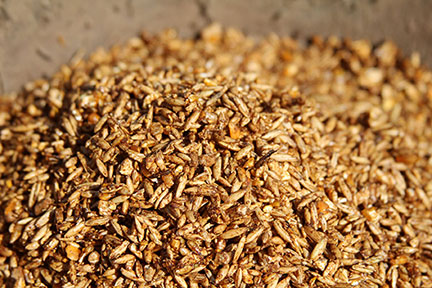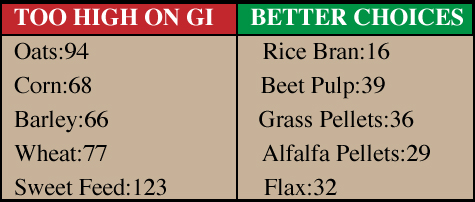Written by Mark DePaolo, DVM. COPYRIGHT © 2012 All rights reserved.
How do horses digest food?
Horses by nature are grazers; they are designed to eat for about 18 hours a day. In the wild, horses grazed on whatever shrubs, grass and weeds were available as they moved with their herds. Because of domestication, horses have changed to only eating two times a day. Horses were not designed to fast. They fast only when they are sleeping, the rest of the time; they eat (or should be eating). When a horse’s diet lacks enough long stem fiber (hay), the cecum is only partially filled. This causes a gap in the intestinal tract which can result in ulceration or potentially even colic. To keep the intestinal tract full, a horse needs to be fed frequently.
The Anatomy Of A Horse's Digestive System
Stomach: creates acid to break down protein
Small Intestine: digests fat and carbohydrates
Cecum: digests long stem fiber (hay) through fermentation.
Horses do not have a gall bladder so they can not store digestive enzymes.
Horses were not designed to eat sugars or carbohydrates. Horses had the opportunity to feed on complex carbohydrates once yearly in the spring when the grass would “head out” and seeds were formed. This was perfect timing because most years horses were lean from a hard winter. Today, not only are most feeds grown with chemicals, fertilizers and herbicides but the commercialization of nutrition and the genetic modification of feed have resulted in a change in nutritional habits.
Carbohydrates
There are three types of carbohydrates: sugars, complex carbohydrates (grains) that are digested and used as sugars, and structural carbohydrates that are used as vegetable type of food.
Hay contains structural carbohydrates and grain contains complex carbohydrates. One is like feeding a Snickers™ and the other like feeding broccoli. Often people don’t realize that 95% of all horses would do just fine (and actually be healthier) if we fed them only grass hay and a good quality comprehensive, complete vitamin/mineral supplement.

We have been trained by feed manufacturers that horses need to be fed grains and then they add molasses (a simple sugar) to it to make it look, smell and taste more appetizing. Unfortunately, when we feed complex carbohydrates and simple sugars to our horses it is not without negative side-effects. ALL grains, when digested, are processed and metabolized as sugar.
Feeding of grains and sugars causes the pancreas to secrete insulin. This hormone is normally used by the cell membrane to process sugar and force it into the cell. With time and saturation of the cell with glucose (sugar used as an energy source by the cell), a condition can occur that is called Insulin Resistance (IR). This is when the cell will no longer respond to the un-naturally high levels of insulin which results in a high blood sugar situation. This condition is one step away from Diabetes. We believe that chronic IR can lead to more devastating diseases such as Hypothyroidism and Cushings (a disease that can lead to founder).
Glycemic Index
The very best way to evaluate whether or not we should be feeding a certain type of feed is the “Glycemic Index” (GI). The GI is a measurement of the amount of sugar in a certain food or feed.
All grains have a higher GI than table sugar, therefore, it would be better for your horse to feed 2 pounds of table sugar than 2 pounds of grain.
When the GI was first established the formulators of the index gave Glucose (a sugar) an arbitrary number of 100. So, anything with a GI of greater than 100 is digested and used as MORE PURE than Glucose and anything with a GI of less than 100 is digested and absorbed and metabolized as LESS PURE than glucose. FYI table sugar has a GI of 59.

What are the effects of poor feed choices?
Many horses are allergic to sugar in the diet. It is commonly manifested as hives, stocking up, mood swings, tying-up and body/back soreness. High sugar/grain content diets can adversely affect the functioning of the immune system. Horses with immune mediated diseases or that are immune compromised should never be fed grains especially in the form of sweet feeds. Rehabillitating from diseases such as EPM (Equine Protozoal Myeloencephalitis), West Nile Virus, allergies, bacterial, protozoal, ricketsial or viral infections requires an immune system that is functioning at the highest level possible.
Making Better Choices
Most horses if they were being fed properly would require only a small amount of “concentrate” feed (pelleted feeds) so that they will eat their supplements. This being said there are a lot better choices of feed to entice a horse to consume its supplements than grains or sugars.
A combination of alfalfa pellets and unstabilized rice bran for those who don’t want to soak their horses feed. Beet pulp is a good choice for those who don’t mind soaking. If you are feeding straight grass hay then alfalfa pellets are great because they have a low GI.
Unstabilized rice bran is preferable to the stabilized version in several ways. First, it’s much cheaper (about 1/3 as much), secondly in order to stabilize rice bran it is extruded (pushed, under high pressure, through a very small hole) to make a pellet. The extrusion process produces a high level of heat. Therefore, rice bran when pelleted is basically cooked; this causes denaturing of the vitamins and decreases some of the nutritional value of the bran. The stabilization process is utilized to help prevent it from going rancid. The only time that this is actually an issue is in the hottest months of the summer.
Many horses that are being fed high carbohydrate diets could be fed much more hay during the day if we would substitute concentrate feeds that were a lower glycemic index. Providing your horse with more fibrous feed throughout the day is a terrific way to help prevent ulcers, cribbing, and colic. Feeding of a low glycemic index feed will also prevent diseases such as Equine Polysaccharide Storage Myopathy (EPSM), Monday Morning Disease and other diseases that cause tying-up, and body soreness type syndromes.

Often times, unsolved problems and issues are also nutritionally related. We have proven via Horse Hair Analysis™ (HHA) testing that most of our domestic horses are deficient in minerals. This process of horse hair analysis, frequently used in humans, provides a full biochemical analysis of the animal’s nutritional and medical health.
For example every horse that tested low in chromium was previously diagnosed as having “Cushings” . Chromium deficiency can only occur by two means, not enough chromium in the diet or feeding too many simple sugars or complex carbohydrates. These horses need to be fed extra chromium and have a very limited level of carbs and sugars in their diet.
We recommend whenever you change your horses diet to low GI feed that you start with about the same amount of concentrate that you are feeding now. Start with about 2/3 alfalfa pellet and 1/3 rice bran. If you prefer to use something like beet pulp (W/O molasses) 1/3 beet pulp, 1/3 alfalfa pellets, 1/3 rice bran. It is best to switch your horses’ diet gradually and include weekly to every other day dosing with a probiotic during the transition period. Once your horse is accustomed to the new feed, it is recommended to add olive oil as a fat source if you feel like your horse needs to increase weight.
Tips for proper nutrition:
- Horses should have access to a low glycemic grass hay all day long.
- It is very important to evaluate your feed program on the “Glycemic Index” (GI).
- Horses were not designed to eat sugars or carbohydrates. High sugar diets are detrimental to your horse's health and well-being.
- 95% of all horses would be healthier if they were fed only grass hay and a good quality comprehensive, complete vitamin/mineral supplement.
This information is for educational purposes only and should not be considered as Dr. DePaolo diagnosing your horse’s health. DePaolo Equine Concepts, Inc. recommends that you consult your regular veterinarian regarding specific health concerns.

